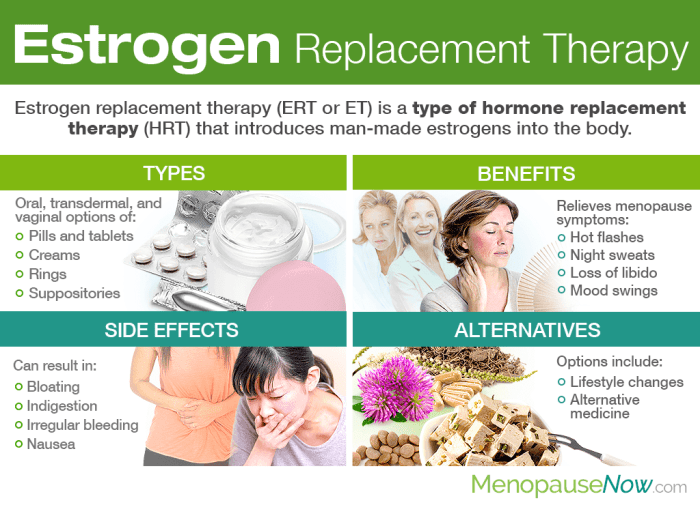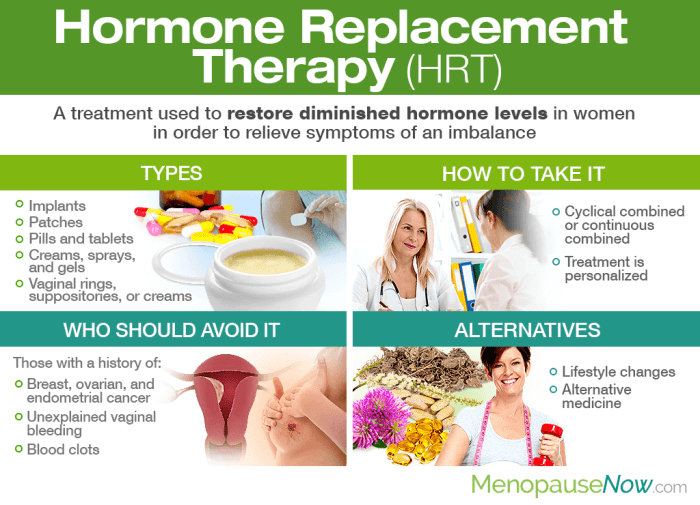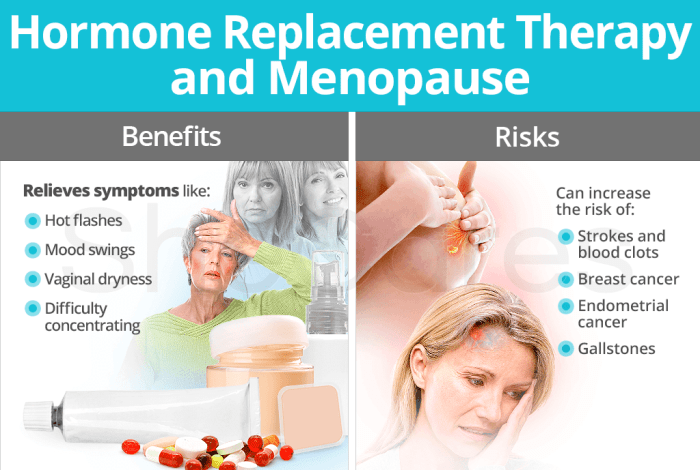Menopause hormone therapy, a topic often shrouded in misconceptions, plays a crucial role in alleviating the myriad of symptoms associated with menopause. As women transition through this significant life stage, understanding the intricacies of hormone therapy can empower them to make informed decisions about their health and well-being.
This comprehensive guide delves into the different types of hormone therapy available, their mechanisms of action, and the potential benefits and risks involved. It also provides practical guidance on choosing the right therapy, managing side effects, and exploring alternative treatments.
Menopause Overview
Menopause is a natural transition in a woman’s life that marks the end of her reproductive years. It occurs when the ovaries stop producing eggs and the levels of the hormones estrogen and progesterone decline.
The hormonal changes that occur during menopause can cause a variety of symptoms, including hot flashes, night sweats, mood swings, and vaginal dryness. Menopause can also increase the risk of certain health conditions, such as osteoporosis and heart disease.
Common Symptoms of Menopause
- Hot flashes
- Night sweats
- Mood swings
- Vaginal dryness
- Sleep problems
- Weight gain
- Loss of libido
- Osteoporosis
- Heart disease
Hormone Therapy Options

Hormone therapy is a treatment option for women experiencing symptoms of menopause. It involves taking hormones to replace the ones that the body stops producing during menopause.
There are two main types of hormone therapy:
- Estrogen therapy: This type of therapy replaces the estrogen that the body stops producing during menopause. It can help to relieve symptoms such as hot flashes, night sweats, and vaginal dryness.
- Progestin therapy: This type of therapy is used to protect the uterus from the effects of estrogen. It is often used in combination with estrogen therapy.
Hormone therapy can be taken in a variety of forms, including pills, patches, and injections. The type of therapy and the dosage will be determined by the woman’s individual needs and symptoms.
Benefits of Hormone Therapy
- Relieves symptoms of menopause, such as hot flashes, night sweats, and vaginal dryness
- Protects against osteoporosis
- May reduce the risk of heart disease and stroke
- May improve mood and cognitive function
Risks of Hormone Therapy, Menopause hormone therapy
- Increased risk of breast cancer
- Increased risk of blood clots
- Increased risk of stroke
- May cause side effects such as nausea, vomiting, and bloating
The risks and benefits of hormone therapy should be discussed with a doctor before starting treatment.
Choosing the Right Hormone Therapy
Choosing the right hormone therapy (HT) is a critical decision that can significantly impact your well-being during menopause. It involves carefully considering your individual needs, symptoms, and risk factors.
To make an informed decision, consult with a healthcare professional who specializes in women’s health or menopause management. They can provide personalized guidance and help you weigh the potential benefits and risks of different HT options.
Factors to Consider
- Type of menopause:Natural, surgical, or premature menopause can influence the type of HT recommended.
- Symptoms:The severity and type of menopausal symptoms, such as hot flashes, night sweats, vaginal dryness, or mood changes, will determine the most suitable HT.
- Medical history:Conditions like heart disease, stroke, breast cancer, or blood clots can affect the safety and appropriateness of certain HT options.
- Lifestyle factors:Smoking, alcohol consumption, and exercise habits can influence the effectiveness and safety of HT.
li> Personal preferences:Some individuals may prefer oral medications, while others may opt for transdermal patches or vaginal creams.
Managing Side Effects

Hormone therapy (HT) can be an effective treatment for managing menopausal symptoms, but it can also cause side effects. The most common side effects of HT include:
- Breast tenderness
- Nausea
- Headaches
- Mood swings
- Vaginal bleeding
These side effects are usually mild and go away after a few months. However, if you experience any severe side effects, you should talk to your doctor.
Tips for Managing Side Effects
There are a number of things you can do to help manage the side effects of HT:
- Start with a low dose of HT and gradually increase the dose as needed.
- Take HT with food to help reduce nausea.
- Avoid caffeine and alcohol, which can worsen side effects.
- Exercise regularly to help improve your mood and energy levels.
- Talk to your doctor about any side effects you experience.
Importance of Regular Follow-Up Appointments
It is important to have regular follow-up appointments with your doctor while taking HT. Your doctor will check your progress and make sure that the HT is working for you and that you are not experiencing any serious side effects.
Alternatives to Hormone Therapy: Menopause Hormone Therapy

Hormone therapy is not the only option for managing menopause symptoms. There are several alternative treatments available that can provide relief from hot flashes, night sweats, and other symptoms.
Some of the most common alternative treatments include:
- Lifestyle changes:Simple lifestyle changes, such as eating a healthy diet, getting regular exercise, and reducing stress, can help improve overall health and well-being and reduce the severity of menopause symptoms.
- Herbal remedies:Some herbal remedies, such as black cohosh and red clover, have been shown to be effective in reducing hot flashes and other menopause symptoms. However, it is important to note that herbal remedies can interact with other medications, so it is important to talk to your doctor before taking any herbal supplements.
- Acupuncture:Acupuncture is a traditional Chinese medicine technique that involves inserting thin needles into the skin at specific points on the body. Acupuncture has been shown to be effective in reducing hot flashes and other menopause symptoms.
- Cognitive behavioral therapy (CBT):CBT is a type of talk therapy that can help you learn how to manage stress and improve your coping skills. CBT has been shown to be effective in reducing hot flashes and other menopause symptoms.
The best alternative treatment for you will depend on your individual symptoms and preferences. It is important to talk to your doctor about the different options available and to find the treatment that is right for you.
Ending Remarks
Menopause hormone therapy remains a valuable tool in the management of menopausal symptoms. By understanding the available options, weighing the potential benefits and risks, and working closely with a healthcare professional, women can navigate this transition with confidence and embrace the next chapter of their lives with renewed vitality.
General Inquiries
What are the common symptoms of menopause?
Hot flashes, night sweats, vaginal dryness, mood swings, and sleep disturbances are common symptoms of menopause.
How does hormone therapy work?
Hormone therapy replaces the hormones that decline during menopause, alleviating symptoms and restoring hormonal balance.
What are the different types of hormone therapy?
Estrogen-only therapy, progestin-only therapy, and combined estrogen and progestin therapy are the main types of hormone therapy.
What are the risks of hormone therapy?
Hormone therapy may increase the risk of blood clots, stroke, and certain types of cancer.
What are the alternatives to hormone therapy?
Lifestyle changes, herbal remedies, and certain medications can be explored as alternatives to hormone therapy.